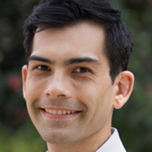The power of the humble bubble: applications in personal health

February 26, 2021 1:00-2:00 p.m.
James Kwan, MPhil, BSc, MSc, PhD
Associate Professor of Engineering Science
Balliol College, University of Oxford
ABSTRACT: Acoustic cavitation is the use of sound waves to nucleate and drive bubble motion within a fluid. With this bubble motion, acoustic cavitation can provide localised changes in fluid momentum, temperature, and chemical composition. It has therefore been proposed as an alternative approach to address challenges that face personal health. In this talk, I want to share how my research group is applying acoustic cavitation to tackle some of these challenges by controlling the spatial and temporal nucleation of acoustic cavitation and understanding the resulting effects. For example, high frequency sound waves and acoustic cavitation may play a role in facilitating the dispersal of bacterial biofilms that infect surfaces in our bodies, devices, and equipment. To further control acoustic cavitation, we add exogenous gas bubbles, i.e., cavitation agents, into the system. By designing the structure and modifying the material of a cavitation agent, we can further tune the local mechanical, thermal, and chemical effects from acoustic cavitation for a specific application. For example, we can load therapeutics into a multi-cavity cavitation agent comprised of a degradable polymer and acoustically implant them into tissue for sustained release to site-specific diseases such as peripheral artery disease. Once implanted into the tissue, these particles will enhance the local ultrasound contrast, providing direct verification for successful implantation. In summary, acoustic cavitation may be a new platform for controlling the local mechanical, chemical, and thermal properties of an environment, which is useful for overcoming the challenges in personal health.
BIOGRAPHY: James Kwan studied chemical engineering at Rensselaer Polytechnic Institute and continued his post-graduate studies at Columbia University also in Chemical Engineering. After, James moved to the UK and did a postdoc at the University of Oxford developing nanoparticles for ultrasound enhanced drug delivery. He was awarded the W.W. Spooner Junior Research Fellowship at the University of Oxford for this work. After his postdoc at Oxford, James joined a spinout company developing ultrasound methods to enhance drug delivery to tumours. Since, he has worked as an Assistant Professor at the School of Chemical and Biomedical Engineering at Nanyang Technological University Singapore (SCBE), where he was awarded numerous research grants and the AIChE Singapore Local Society Outstanding Young Researcher. Now, James is an Associate Professor at the Department of Engineering Science at the University of Oxford and a Tutorial Fellow at Balliol College. He is part of the Physical Acoustics Lab (PacLab). His research interests remain on the topic of ultrasound enhanced therapies and diagnostics and has now expanded to include the application of mechanical, thermal, and chemical effects of ultrasound and cavitation to address challenges in sonochemistry.




